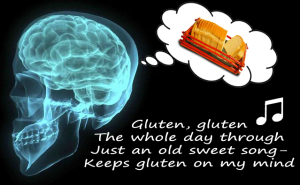 The internet is full of scary stories about gluten, many portraying it as some sort of food super-villain. That’s not surprising, considering gluten-related conditions like Celiac disease are on the rise. In fact, Celiac disease is 4 times more common than it was 60 years ago[1]. Researchers still don’t know why that is, but the leading theory is that it has to do with a change in our microbiomes[2], which is the collection of microorganisms that reside in our bodies. (Spoiler: I’m planning an awesome blog post about this in the near future).
The internet is full of scary stories about gluten, many portraying it as some sort of food super-villain. That’s not surprising, considering gluten-related conditions like Celiac disease are on the rise. In fact, Celiac disease is 4 times more common than it was 60 years ago[1]. Researchers still don’t know why that is, but the leading theory is that it has to do with a change in our microbiomes[2], which is the collection of microorganisms that reside in our bodies. (Spoiler: I’m planning an awesome blog post about this in the near future).
The link between Celiac disease and gluten is well-established…but what about gluten and the brain? Some people believe that gluten is bad for you even if you haven’t been diagnosed with Celiac disease. Some hypothesize that we should avoid gluten altogether because it can negatively affect our brains.
But is there any evidence to support this hypothesis? Let’s find out.
Food Myth #2: Eating gluten causes or can worsen Autism, ADHD, Alzheimer’s and Dementia.
The Facts:
Let’s start by first getting a better understanding of what gluten is. Gluten is a protein that is found in many grain products (namely, wheat, barley, and rye.) It’s what gives elasticity to dough, helps it rise, and gives the final product a nice chewy texture. Gluten, even traces of it, can be found in many of the foods we eat such as salad dressings and even candy bars. There are many important nutrients that can be found in foods that also contain gluten. Because gluten is found in so many foods, eliminating it from your diet completely is no small thing.
Celiac Disease
In people with Celiac disease, ingesting gluten causes the body to start attacking the cells in the small intestine, which can damage them. The villi in the small intestine are what absorb nutrients from the foods we eat, and when they become damaged from this auto-immune response, the person is not able to absorb nutrients properly.[3] This can lead to malnutrition, which prevents the body from being able to properly produce important neurotransmitters that affect mental function.
In these people, consuming gluten triggers the “adaptive-immune response.” This is the process that creates antibodies. In this case, those antibodies effectively pit the body against itself. The allergic response to response to gluten essentially triggers an inflammatory response, which isn’t good, because inflammation has been found to worsen many medical conditions as well as being painful in and of itself.
There are specific blood tests that can be performed to check for Celiac, but often times a biopsy of the small intestine is required for a firm diagnosis. There is no known cure for this disease, and the main treatment consists of sticking to a strict gluten-free diet.
Non-Celiac Gluten Sensitivity (NCGS)
There is also another condition that can be triggered by ingesting gluten called non-celiac gluten sensitivity[4]. In this case, a different part of the immune system is triggered: the innate immune response. In this case, specific antibodies are not formed, but inflammation still occurs. People with a non-celiac gluten sensitivity can often feel sick when ingesting gluten, but it doesn’t cause actual damage to their intestines. There is unfortunately no diagnostic test for this condition, so it can make it more difficult to determine if someone is truly sensitive to gluten, or if their gastrointestinal symptoms are caused by something else.
So that’s the lowdown on gluten. There are some definite benefits to eating gluten, as well as some major risks to your gastrointestinal health if you suffer from Celiac disease. Now let’s look at whether those risks extend to your brain as well. Here are some of the questions my clients in the Salt Lake City area have asked me in the past:
Does gluten cause ADHD?
1 out of 7 children with ADHD were found to have Celiac disease, and a study[5] found that in those with Celiac disease, a gluten-free diet significantly improved their ADHD-related symptoms. However, that is only one study, and the sample size was quite small, which isn’t ideal. As a general rule, it’s not a good idea to draw firm conclusions from a single study with a small sample size.
Therefore, most current research says there is not really proof that eating gluten causes ADHD, but if people who suffer from ADHD have undiagnosed celiac disease, it can make the condition worse. In short, while there may be a correlation between gluten and ADHD, it’s important to remember that correlation does not equal causation.
What about Autism?
A large study done in Sweden found no association between Autism spectrum disorders and Celiac disease[6]. Furthermore, a “well-designed study from Brazil found no statistically demonstrable association between Celiac disease or NCGS and autism spectrum disorder.”[7]
As far as treating Autism spectrum disorders (ASD) with a gluten-free diet, multiple double-blinded trials did not find any benefit to a gluten-free diet when treating autism[8]. Some have suggested that a combination of a gluten-free diet with a casein-free diet may be effective, but a 2008-review of the literature found no real benefit there, either.[9]
That said, a few studies did report some benefit from a gluten-free diet for those with Autism, however there may be some observer bias that can’t be adjusted for. A subset of those with Autism may have a NCGS (non-Celiac Gluten Sensitivity) that can’t be diagnosed[10], which may explain why some studies did show some a benefit.
This is a difficult area to study, which is probably why the evidence is not entirely clear. More research is clearly warranted, but the research that does exist hasn’t really shown enough of a benefit to warrant switching to a gluten-free diet as a treatment for ASD. More importantly, there doesn’t seem to be any reason to think that gluten (or Celiac disease) causes Autism.
Does gluten cause or contribute to dementia and Alzheimer’s?
Because non-Celiac Gluten Sensitivity causes inflammation, some people hypothesize that it can also cause neuro-inflammation, which may lead to cognitive dysfunction.[11] But that does not mean eating gluten will cause this same response in everyone that eats it.
There can definitely be neurological symptoms present in those with undiagnosed or untreated Celiac disease,[12] however it is likely related to nutritional deficiencies caused by the damage done to the intestines rather than by gluten itself. If a person were to go undiagnosed with Celiac disease for a long time, a more long-lasting nutrient deficiency theoretically has a higher likelihood of causing brain damage. In people without Celiac disease or an NCGS, there is no evidence that eating gluten will cause dementia or Alzheimer’s, and a recent study published in the American Journal of Clinical Nutrition showed that eating whole grains (including wheat) can actually protect your cognitive function[13].
Whew! We just covered a lot of information, didn’t we? But I hope you’ll agree that it’s an important topic. Because gluten can be found in so many products, and because gluten-related conditions can be so harmful, it’s critical that we educate ourselves on the subject.
So does gluten negatively affect your brain? At the moment, the answer appears to be no. However, more research is required, and there is some correlation between gluten-related diseases and the conditions involving the brain. For that reason, the verdict is…
Verdict: Unlikely, but plausible
Conclusion:
For those with diagnosed Celiac disease, eating gluten is clearly not a good idea, and can cause cognitive and behavioral disturbances in large part due to nutritional deficiencies.
Since there is no way to officially diagnose a NCGS, the only way to really determine if you are sensitive to gluten is to eliminate it from your diet and see what happens…which is neither fun or easy. Furthermore, I would not recommend eliminating gluten from your diet without seeing a physician and getting a diagnosis of celiac disease first, and then consulting with a registered dietitian, such as myself, as your diet may become deficient in important nutrients. If you think you may have a NCGS, it is also important to talk with a doctor first before making changes to your diet or it may affect their ability to distinguish true Celiac disease from a NCGS.
If you do not have symptoms of Celiac disease or NCGS, you can continue eating gluten secure in the knowledge that it is not destroying your brain, and in fact may be protecting it. I think we can officially take gluten off the food super-villain list now.
If you have recently been diagnosed with Celiac disease, or are wondering if you are having problems with gluten, and need information on how to follow a gluten-free diet, Salt Lake NutriCoaching can help. I offer a package for those suffering from gastrointestinal complaints. In only an hour, I can:
- Help you understand why you may be experiencing gastrointestinal symptoms and what nutrition-related steps you can take to relieve them
- Help you plan a simple, easy-to-follow gluten-free diet that is still delicious and contains all the nutrients you need to stay healthy
- Provide you with additional educational materials that you can take home with you.
If you mention this article, you can receive 10% off of this package!
Give me a call at 801-815-7301 to find out more!
[1] http://www.mayo.edu/research/discoverys-edge/celiac-disease-rise
[2] http://time.com/3511235/gluten-free-celiac-disease/
[3] https://celiac.org/celiac-disease/what-is-celiac-disease/
[4] http://www.celiaccentral.org/non-celiac-gluten-sensitivity/
[5] http://www.ncbi.nlm.nih.gov/pmc/articles/PMC3184556/
[6] http://archpsyc.jamanetwork.com/article.aspx?articleid=1743008
[7] http://www.celiaccentral.org/SiteData/docs/NFCAWebina/9f1795d8ffd82e77/NFCA_Webinar_The%20Gluten-Free%20Link_%20ADHD_Autism_Celiac%20Disease_slides.pdf
[8] http://www.ncbi.nlm.nih.gov/pubmed/23688532
[9] http://www.ncbi.nlm.nih.gov/pubmed/18425890
[10] http://www.ncbi.nlm.nih.gov/pubmed/23688532
[11] http://www.ncbi.nlm.nih.gov/pubmed/25642988
[12] http://www.ncbi.nlm.nih.gov/pubmed/15825133
[13] http://ajcn.nutrition.org/content/98/5/1263.abstract
